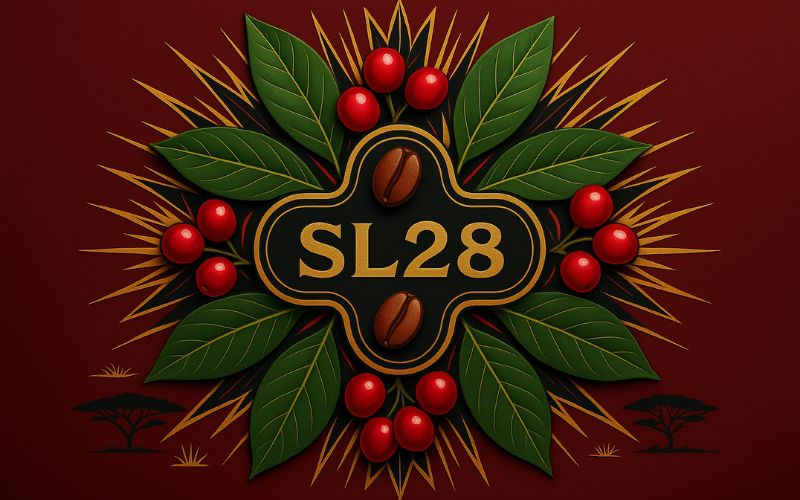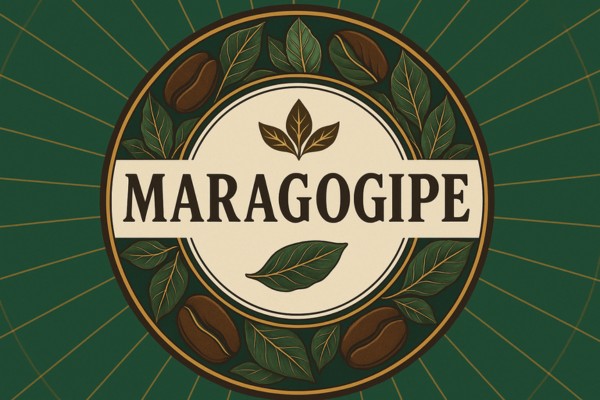
SL28: The Star of Kenya
Delve into the story of SL28, the celebrated coffee variety that defines the classic Kenyan flavor profile. Learn about its selection by Scott Laboratories in the 1930s, its remarkable drought resistance, and its unmistakable cup profile of intense blackcurrant, grapefruit, and tomato-like acidity.
SL28: The Quintessential Kenyan Coffee
When specialty coffee lovers talk about the classic "Kenyan profile," they are, more often than not, talking about SL28. This celebrated variety is renowned for its incredibly complex and intense flavor, often with a savory-sweet quality that is unlike any other coffee in the world.
SL28 is not a hybrid created in a lab, but rather a single-tree selection made from the diverse coffee landscape of Kenya in the 1930s. It was chosen for its drought resistance and its outstanding cup quality.
The plants themselves are tall and have a distinctive appearance, with broad leaves and a mix of green and bronze leaf tips. They produce large, beautiful beans that are packed with the potential for extraordinary flavor.
The Scott Laboratories Selections
The "SL" in SL28 stands for Scott Laboratories, a research organization hired by the Kenyan government between 1934 and 1963 to catalogue and improve the coffee grown in the country. Their goal was to identify varieties that combined high yields, drought resistance, and, most importantly, superior cup quality.
Scientists at Scott Labs undertook a massive project, collecting coffee samples from all over Kenya and neighboring Tanzania. They selected individual trees that showed promising traits and propagated them for further study.
In the late 1930s, they identified a particularly promising tree in a field of a variety called "Tanganyika Drought Resistant." This single tree was selected and designated SL28. While its exact genetic lineage is not perfectly documented, it is widely believed to be related to the Bourbon variety, which had been introduced to Kenya by Scottish and French missionaries.
SL28 quickly became the go-to variety for farmers in Kenya who were focused on quality, and it formed the backbone of the country's specialty coffee industry for decades.
A Uniquely Intense Flavor Profile
SL28 is famous for a cup profile that is intense, complex, and instantly recognizable. It is a coffee that truly stands out on a cupping table.
- Acidity: This is the hallmark of SL28. It is often described as bright, phosphoric, and complex. It can have a winey, blackcurrant quality, a sharp grapefruit-like citrus note, or even a savory, tomato-like acidity.
- Body: The body is typically medium to full, with a rich and juicy mouthfeel that complements the intense acidity.
- Aroma: The aromatics are powerful and can range from sweet dark fruits to floral and winey notes.
- Flavor: The flavor is where SL28 truly shines. It is known for its incredibly distinct notes of blackcurrant, blackberry, and tropical fruits. This is often balanced by a deep sweetness and a savory complexity that is unique in the coffee world.
Cultivation: Quality Over Quantity
Like many of the world's highest-quality coffee varieties, SL28 presents some significant challenges for farmers.
- Low Yield: It is not a particularly high-yielding plant, which is why Scott Labs also selected the more productive SL34 to be grown alongside it.
- Disease Susceptibility: SL28 is highly susceptible to the major coffee diseases, including coffee leaf rust and Coffee Berry Disease (CBD). This makes it a very risky crop to grow, especially in areas where these diseases are prevalent.
- Drought Resistance: On the positive side, it is known for being exceptionally drought-resistant. Its deep root system allows it to thrive in the dry conditions that can be common in many of Kenya's growing regions.
Because of its low yields and disease susceptibility, many farmers in Kenya have replaced their SL28 trees with newer, more resistant hybrids like Ruiru 11 and Batian. However, the superior cup quality of SL28 means that it still commands a very high price, and dedicated farmers continue to grow it for the specialty market.
Key Growing Regions
While it was selected in Kenya and is synonymous with that country's coffee, SL28 has also traveled to other parts of the world.
- Kenya: This is the home of SL28, and it is here that the variety reaches its full potential. The volcanic soils and high altitudes of regions like Nyeri, Kirinyaga, and Murang'a are perfect for producing classic SL28 profiles.
- Latin America: In recent years, quality-focused producers in countries like Colombia, Costa Rica, and El Salvador have begun planting SL28. While the flavor profile can be different from a classic Kenyan, these coffees are still highly complex and sought after.
Brewing to Tame the Intensity
The intensity of SL28 can be a challenge to brew, but when you get it right, the results are spectacular.
- Recommended Methods: Pour-over methods are excellent for managing the powerful acidity and highlighting the complex fruit notes. A Kalita Wave or other flat-bottom brewer can help to produce a balanced and sweet cup.
- Let it Rest: SL28 often benefits from a slightly longer "rest" period after roasting than other coffees. Letting the beans rest for 1-3 weeks can help to mellow the intensity and allow the flavors to open up.
- Water and Ratio: Using a water with good buffering capacity can help to balance the acidity. A slightly wider coffee-to-water ratio (e.g., 1:17) can also help to create a more open and elegant cup.
Conclusion: A True Specialty Icon
SL28 is a true icon in the world of specialty coffee. It is a testament to the importance of agricultural research and the pursuit of quality.
It is a demanding coffee, both for the farmer to grow and for the barista to brew. But its reward is a truly unforgettable sensory experience. The intense, complex, and savory-sweet profile of a great SL28 is one of the high points of what coffee can be, and it remains a benchmark for quality around the world.


